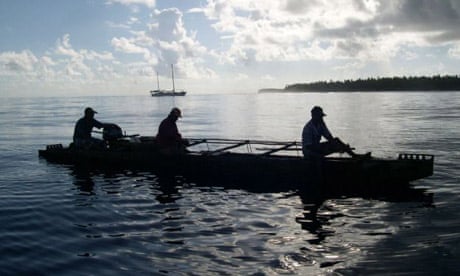Fish catches in some of the poorest nations in the world have been grossly underestimated, scientists warned yesterday.
The implication is that global fish stocks, already widely acknowledged to be under heavy pressure, are in far more in danger than thought. The underreporting particularly threatens the hundreds of millions of poor people around the world who rely on fish for subsistence.
A reconstruction of actual catches in 20 places around the globe showed that fish landings that were not reported were at least as high as the declared catch, and sometimes more than 16 times higher.
"This is underreporting of such magnitude that it boggles the mind," said Professor Daniel Pauly, of the University of British Columbia in Vancouver. The global database of world fish catches is maintained by the UN Food and Agriculture Organisation in Rome. It is based on voluntary declaration, and often misses subsistence and recreational fishing.
The new study, presented to the 11th international coral reef symposium in Fort Lauderdale, Florida, was conducted by scientists from the Sea Around Us project, an international research group based at the University of British Columbia. They visited the locations, questioned local officials and made their own estimates of subsistence fishery calculations since 1950.
They found huge disparities. In American Samoa, the annual haul of fish was 16.6 times greater than the declared catch. Hawaii's anglers and sport fishermen took enough to double the declared catch. The catch off Mozambique was more than six times the official estimate, despite the country's government selling permits to EU fishing fleets. And Tanzanian officials failed to include the island of Zanzibar in its data, although Zanzibari fishermen accounted for 30% of the total catch.
While uncertainties remain, Pauly says: "It is better to be vaguely right than precisely wrong."
Dr Dirk Zeller and Jennifer Jacquet of the Sea Around Us project found that domestic catches in 20 Pacific islands had been declining by between 54% and 86% since 1950, probably because of overfishing near population centres.
This shows that the underreporting does not suggest there are more fish in the sea than thought. Instead it confirms that many fisheries could be perilously close to extinction.
"Since we are finding that small-scale fisheries are greater contributors to overall catches than we previously thought, we need to more closely monitor commercial overfishing so that coastal communities around the globe have the income and food sources they need," Zeller warned.
"You may ask, so what if the data [is] incorrect, as long as the fish are there for us to catch and to eat," he added. "Local fishery resources are crucial for food security purposes, particularly in developing countries, and this is being amplified right now by the current trends in oil prices. All of these Pacific countries rely on imported food, if they don't catch it locally. Those imports come in by ship, therefore food prices will substantially increase. And they are not very rich countries."
